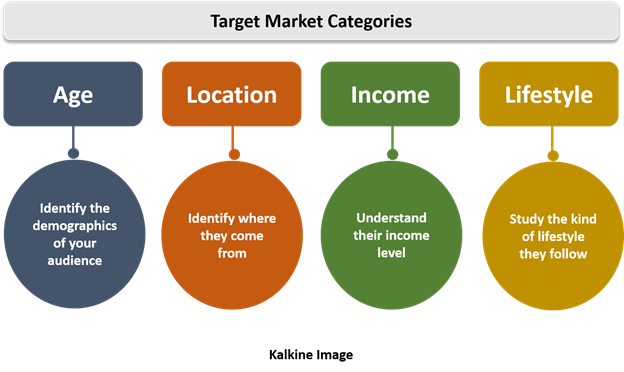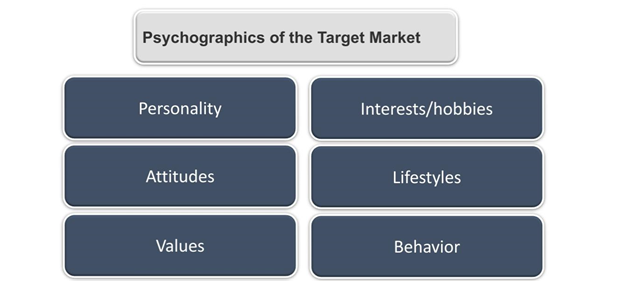Definition
Related Definitions
Target market
What is Target Market?
Target market is a category of people whom marketers focus to sell their products and services. Businesses use their Marketing strategies towards this specific target audience in order to create brand awareness and ultimately brand loyal consumers. It works similarly the way consumers are identified through geography, demographics, income etc.
Given the current status of economies in most of the countries, understanding the target audience is essential more than ever.
Marketers study and research to identify the target market while developing a marketing plan. Without having a specific target audience, marketers can lose sight of the end game and end up losing money and time. Especially, for the small businesses to compete with the larger ones, having a well-defined target market can be very useful.
Target market changes for each business depending upon its requirement. Some real estate developers may target homeowners, and others may target tenants. Some milk producers would be targeting stay-at-home-moms, while others target young kids to sell their products.
Target markets are generally niche markets and hold a strong connection for the businesses.
While the companies identify the target market to sell their products and services, it does not mean that they exclude the consumers apart from their specific criteria. In order to create brand awareness and sell more products, marketers also target an audience which is more likely to buy the product. The broader market is targeted to widen the scope of marketing.
Once the potential customer is identified, businesses can market their products and services in an affordable, efficient and effective manner.
How to identify your target market?
A lot many businesses still do not understand the importance of marketing and identifying their target audience. Eventually, they end up wasting time, money and resources on the consumers who are not keen on their product or services. Hence rather than focusing on effective marketing strategies on a specific audience, they end up targeting larger and unwanted audiences. To avoid it, marketers identify the potential buyer who has particular traits and characteristics which can connect to the product and services being offered.
Understanding your target audience is one step closer to effectively selling goods and services. All you need to know is who it appeals and who will eventually buy it.
Each consumer has its own mindset and choices; hence, not all products and services will apply to every customer. The businesses which understand the need for the target audience spend a reasonable amount of time and money to define and monitor its target market.
Once you identify your target market, it gets easier to draft the marketing strategy. As you understand what appeals to your audience, such as what kind of newspaper your audience read and which TV channel, they watch the most and which time slot is most-watched. If you are marketing on digital platforms, then the target market can be identified through various aspects.
For instance, if you are a launching advertising campaign to sell your luxury spa services located at one place. You wouldn't spend thousands of dollars and target a million people. You would focus on the people who can afford the luxury spa services, whom you would want to get associated with, who are living in the vicinity. So, then you would place an ad in the local newspaper or a local luxury clothing magazine.
Therefore, identifying your target market helps marketers effectively reach the potential buyer.
Sometimes companies conduct surveys and call in focus groups to identify what a consumer needs and if it matches with their product description.

How to categorise the target market?
It is easier to categorise your target market when you divide them into different segments. See if the segment has less competition, because it could yield a higher return on investment.
Another essential feature is that the target market has to fall in line with the company's objective and its vision and mission.
Target market is generally categorised by age, location, income, and lifestyle. Apart from these, gender, education, marital status, income level, age, race, occupation, and geographic location are also included in identifying the target market.
Consumers who fall under these segments are more likely to purchase the same goods and services. For instance, a person with a higher income will buy coffee from Starbucks on the way to the office. It also has a connection with the brand image. He/she would not want to get associated with Dunkin' Donuts.
Marketers also consider psychographics, which are more personal characteristics of a customer, to summarise the target audience. A customer purchasing Adidas sports products will not have similar psychographics to the person buying a unique sports collection from luxury brand Jimmy Choo. The end purpose is identical, but the intention of choosing the brand and product is different.

Image: Kalkine
Is it essential to stick to one niche?
While it is imperative to identify the niche target market to sell your goods and services effectively; it is also essential to understand that one can always target more than one target audience at a time. Marketers usually evaluate their target market once it's identified to get to the basics of marketing.
Businesses need to question themselves while evaluating their identified target market. See if there are enough people who fit the criteria. While you market your product to a specific audience, understand if the target audience needs it. If not, then your marketing efforts will go to waste. Instead, businesses can create a different marketing strategy to generate the need for their product.
Understand what factors drive your target audience to make the purchase decision. Most importantly identify if they can afford the goods and services or not.
Lastly, significant messaging can impact the target audience more remarkably, therefore determine if you can reach the target market with specific messaging and how accessible they are.
